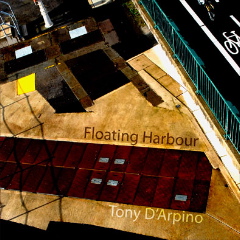Electric Blue Moccasins
Book review by Edward Clarke in The Bristol Review of Books
What is a floating harbour? If you are not from Bristol, it sounds paradoxical, oxymoronic, almost exotic. Is it a harbour afloat? Such a port might be found on the coast of Bohemia, an impossible place from which Antigonus exits, ‘pursued by a Beare’, after leaving Hermione’s daughter exposed on a hillside with what will be perceived as ‘Fairery Gold’. Like Shakespeare’s The Winter’s Tale, D’Arpino’s latest collection of poems, Floating Harbour, describes a world at once magical and real: his haunting work is of art and nature. Bristol’s floating harbour was designed by the great civil engineer William Jessop in the early nineteenth century to provide ships with non-tidal anchorage on the waterfront. This place, once bustling with commerce, then abandoned, but now regenerated with studios and galleries, is D’Arpino’s floating harbour. For the poet it is also where ‘neptune floats’.
D’Arpino, an American abroad, sends us a ‘Postcard from the Coast of [landlocked] Bohemia’ just as Wallace Stevens had earlier sent us ‘A Postcard from the Volcano’: the later is one of Stevens’s ‘Children picking up our bones’, the bones also of the troubadour Bernart de Ventadorn, the Bristolian forger Chatterton, John Clare, Wordsworth, Coleridge, Hölderlin, Osip Mandelstam, and Roger Deakin, among others. But for all of D’Arpino’s transformations of and allusions to others’ works, Floating Harbour is not a book of memory. Blake would say he writes ‘Surrounded by the daughters of Inspiration’. In fact goddesses, nymphs and girls dance wondrously through the collection, sometimes ‘in electric blue moccasins’.
If the book has a presiding shape, it is ‘a tiny orb / spiral spinning’ as D’Arpino says of ‘The Yellow Snail’, and he is concerned with ‘orthography of spiral’ because he is an exacting and visionary poet. D’Arpino writes ‘Above the hidden hot springs // Still flowing below the surface’. A foreigner in love with Bristol today, the poet beholds the river Avon as ‘a dirty goddess / winking at the boys’ because his work wells from underground sources of wisdom. He is also aware that ‘the kids in Bristol are sharp as a pistol / when they do the Bristol stomp’.
Edward Clark is the author of The Vagabond Spirit of Poetry and The Later Affluence of Yeats and Stevens (Palgrave Macmillan). He teaches poetry at Oxford.
Click here to buy from the publisher.
Click here to buy from Amazon.
